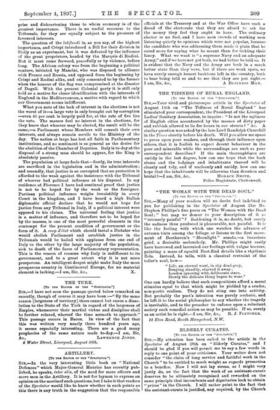LETTERS TO THE EDITOR.
THE ITALIAN SITUATION.
[To THE EDITOR OF THE "SPECTA1'OR:]
Sia,—No one acquainted with the present condition of Italy can find much to except to in your excellent article on "The Situation in Italy" in the Spectator of August 28th. But there are two or three points in that situation that do not seem to be understood in England, and which ought to be made clear. And, firstly, it is not the case that taxation is so oppressive as it is reported to be by the Italians them- selves, especially by the higher classes amongst them, with whom the outcry is a policy of precaution against increase of taxation. The taxes are, as you say, most unjustly distri- buted, and weigh heaviest on the lower classes, who nevertheless make the least complaint. In the wealthier classes no one pays what the law imposes, and it is not in- frequent that only the third or fourth of the nominal tax is actually paid. This evasion of their obligation by all whose social position or political influence enables them to put the requisite pressure on the officials, in the rare cases of their probity, has the effect of throwing an undue proportion of the necessary taxation on the visible incomes of the smaller bourgeoisie, or on undertakings which are open to inspection, thus at once paralysing enter- prise and disheartening those to whom economy is of the greatest importance. There is no useful recourse to the Tribunals, for they are equally subject to the pressure of favoured interests.
The question of the latifundi is, as you say, of the highest importance, and Crispi introduced a Bill for their division in Sicily as an experiment, but it was defeated by the influence of the great proprietors, headed by the Marquis di Rndini. But it must come forward, peacefully or by violence, before long. The African colony was from the beginning a political venture, initiated by Mancini, who was disposed to alliance with France and Russia, and opposed from the beginning by Crispi and Rudini alike, and only consented to by the former when the honour of the flag was compromised at the disaster of Dagali. With the present Colonial party it is still only held as a motive for closer identification with the interests of England in the Mediterranean, a motive with regard to which our Government seems indifferent.
What you note of the lack of interest in the elections is not the worst of it—a large vote is only brought out by corruption —even 45 per cent. is largely paid for, at the rate of five lira the vote. The masses feel no interest in the elections, for they know that whoever may be elected, the result will be the same,—a Parliament whose Members will consult their own interests, and always remain servile to the Ministry of the day. The nation at large has lost all faith in Parliamentary institutions, and no sentiment is so general as the desire for the abolition of the Chamber of Deputies. Italy is to-day at the disposal of a strong man should he appear, for the King is absolutely passive.
The population at large feels that—firstly, its true interests are sacrificed in the legislation and in the administration ; and secondly, that justice is so corrupted that no protection is afforded to the weak against the insistence with the Tribunal of whoever had political influence at his disposal. In my residence at Florence I have had continual proof that justice is not to be hoped for by the weak or the foreigner. Partisan political influence weighs irresistibly in every Court in the kingdom, and I have heard a high Italian diplomatic official declare that he would not hope for justice from any Tribunal in Italy, if a political interest were opposed to his claims. The universal feeling that justice is a matter of influence, and therefore not to be hoped for by the masses, is one of the most powerful elements in the contempt for the present condition of government or the form of it. A coup d'etat which should instal a Dictator who would abolish Parliament and establish justice in the Tribunals would be hailed with applause from one end of Italy to the other by the large majority of the population, sick to death of the farce of Parliamentary representation. This is the reason of reasons why Italy is indifferent to its government, and to a great extent why it is not more prosperous. An intelligent despot might make Italy the most prosperous country in Continental Europe, for no material
element is lacking.—I am, Sir, &c., X.



































 Previous page
Previous page